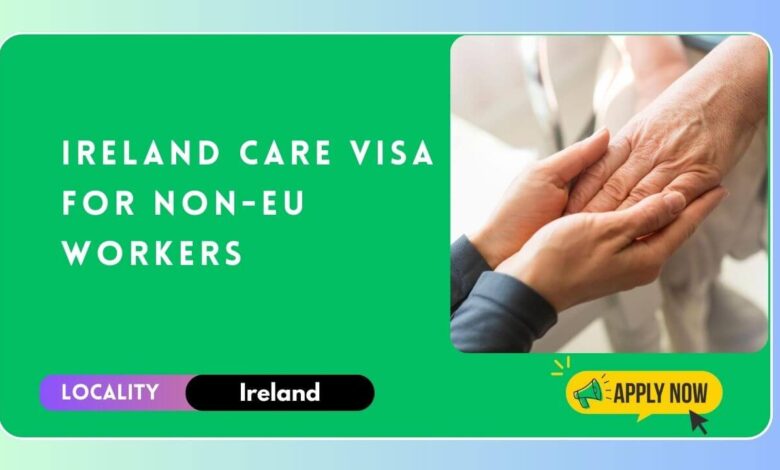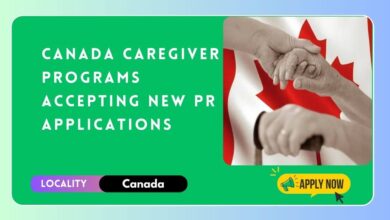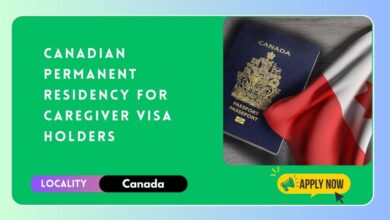Ireland Care Visa for Non-EU Workers 2025 – Check Here

Ireland granted work visas to an additional 1,000 homecare workers in an effort to alleviate the sector’s recruitment crisis and plug the staffing gap with improved compensation and working conditions. This Ireland homecare worker visa has been approved with a 76% approval rate and is processed in just eight business days.
Non-EU nationals will be permitted to reside and work in Ireland’s homecare sector on the condition that potential employers guarantee them a minimum annual salary of €27,000, a minimum two-year employment commitment, and a minimum of four continuous hours of work per day. Ireland is presently grappling with a scarcity of care workers; this year, the Health Service Executive’s services for elderly people failed to provide home support for 6,200 individuals due to the absence of a care worker.
Mary Butler, Minister of State for Older People and Mental Health, stated that the government had budgeted €660 million for homecare packages for the current fiscal year. She stated that while the funds were available to provide homecare packages to those in need, the personnel were not present to execute the plan.
Check Also: Care Assistant Jobs in Dublin Ireland – Apply Now
Despite the availability of 1,000 work permits, only 65 individuals have applied for new work permits granting non-EU caregivers employment rights in the homecare industry as of the composition of this article.
The initiative was launched in January to assist with recruitment difficulties. It resembles an existing framework that governs positions in hospitals and nursing homes. Department of Enterprise, Trade, and Employment supervision is provided for the initiative.
Requirements:
- Valid Job Offer
- Offer of employment from an approved Irish care employer (e.g., nursing home, home care agency).
- Work Permit Application
- Approval of a relevant work permit (such as the Critical Skills Employment Permit or General Employment Permit).
- Proof of Qualifications
- Relevant care qualifications or certifications recognized by Irish authorities.
- Experience
- Prior experience in the care sector, typically at least 1-2 years depending on the role.
- Valid Passport
- Passport valid for the duration of stay in Ireland.
- English Language Proficiency
- Proof of English language skills (may be required depending on the employer or permit type).
- Medical Insurance
- Valid health insurance coverage for the period of stay.
- Background Checks
- Clean police clearance certificate or criminal background check from home country.
- Proof of Funds
- Evidence of sufficient financial means to support yourself until paid employment starts (sometimes required).
- Application Fees
- Payment of visa and permit processing fees.
- Supporting Documents
- Employment contract
- Resume/CV
- Reference letters
- Academic certificates
- Visa Application
- Submit visa application to the Irish Embassy or Consulate in your country after permit approval.
Providers of Quality and Qualifications Ireland (QQI)-accredited training in Ireland include:
Benefits of Ireland Care Visa
- Employment Prospects: A caregiver visa could potentially grant the holder the ability to lawfully work in Ireland, either on behalf of a family member or an employer who requires caregiving services.
- Legal Status: Caregivers can reside and work in Ireland lawfully with a valid visa, which provides stability and peace of mind.
- Access to Services: Legal status grants carers access to a variety of services and facilities in Ireland, including social services, healthcare, and education, as required.
- Prospects for Professional and Personal Development: Engaging in the role of a caregiver in Ireland may present prospects for professional and personal advancement, such as amassing an extensive professional network, enhancing one’s language proficiency, and obtaining practical work experience.
- Cultural Exchange: By immersing themselves in Irish culture, interacting with natives, and learning about Irish customs and traditions, caregivers may be afforded the opportunity to enrich their cultural experiences.
- Financial Stability: Financial stability can be enhanced and the standard of living of the caregiver may potentially be raised through the employment of the caregiver as a source of income.
- Contribution to Community: Caregivers devote significant effort to providing support to families and individuals requiring aid, thereby making a positive contribution to both the community and society at large.
- Prospects for Family Reunification: The ability of caregivers to transport family members to Ireland to be with them may be contingent upon the particular visa category and personal circumstances, thereby fostering familial solidarity and cohesion.
- Potential Routes to Long-Term Residency or Citizenship: Certain circumstances may permit individuals who work as carers in Ireland to qualify for long-term residency or even citizenship if they meet specific requirements.
Visa-sponsored homecare worker jobs in Ireland:
- Visa sponsored Elderly care jobs in Ireland
- Visa-sponsored healthcare assistant jobs in Ireland
- Visa-sponsored homecare jobs in Dublin, Ireland
- IrishJobs.ie
Frequently Asked Questions:
How do I become a care worker in Ireland?
Healthcare professionals from non-EEA countries need an employment permit to work in Ireland. It’s crucial to remember that individuals with employment permits can only work for their designated employer and in the occupation specified on their permit.
Does Ireland require IELTS for caregivers?
Fluency in English is essential for Irish caregivers to communicate effectively. Employers may require proof of English proficiency through tests like IELTS (typically 6.0–7.0) or OET (B to C+). Specific requirements may vary from employer to employer.
What qualifications do I need to become a care assistant in Ireland?
You cannot become a healthcare assistant in Ireland until you earn a relevant FETAC/QQI Level 5 qualification or an equivalent award. You can only complete your QQI training with an accredited provider.

